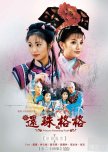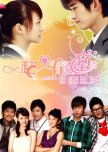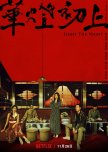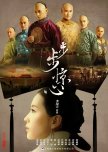
Was this review helpful to you?

This drama was one of the best I've ever watched, and every time I hear the music, a wave of nostalgia comes over me. So what if this drama doesn't adhere to the original BoF plotline? There have been so many versions of the same story already, and I think it's great that this Chinese version is bringing something new to the table!
I've watched the Korean version and this version, and honestly, I think they're both amazing (but I've watched Meteor Shower 2 many more times than BoF!) Zhang Han and Zheng Shuang who play the two main leads are a great on-screen couple, and you can really feel the emotion and love they share. The side characters are all great and many times entertaining. Duan Mu Lei, especially, was cast perfectly and his story is heartbreaking and inspiring--and in my opinion, he's much more attractive than Kim Hyn Joong in BoF :)
I loved this drama much more than the first one (Meteor Shower 1). All the actors are so much more attractive in Meteor Shower 2 and the storyline is more gripping. I think that if you want to get into this Chinese version of BoF, start with this sequel instead of from the beginning.
This drama is the perfect blend between light-heartedness and seriousness--it's not completely a sappy melodrama but it's also not a fluffy, light rom-com drama. It's a great watch for anyone who loves romantic dramas and Boys Over Flowers!
Was this review helpful to you?

This review may contain spoilers
Light the Night is a mature drama with a superb cast. The acting was phenomenal, especially from the two lead actresses, whose relationship is the focal point of the drama. The betrayals feel intense, and their complicated feelings about each other are well-portrayed. Ruby Lin’s camera presence is strong and captivating. Yang Jinyan as Su Qingyi was such a pleasant surprise for me, as someone who’s never heard of her as an actress before. Her Su Qingyi character was so well fleshed out and acted. Such an interesting antagonist from the very start. One of her expository scenes is when she comforts a sobbing Lo Yunung in bed, soothing her broken heart. The viewer can hardly believe the hatred that arises between the two protagonists later in the story. But as much as we can hate Su Qingyi for her betrayal of Lo Yunung, it’s still hard not to pity her — a reserved woman by nature, festering her unrequited love for Chiang Han in silence, while watching her friend’s happiness with him from afar. In the end, I felt that their mutual selfishness and perhaps delusional ignorance of each other’s feelings brought the destruction of the friendship, rather than one being a “villain” antagonizing the other.
One of my qualms about this drama is not the writing or acting — it’s that the drama is written for the male gaze, while on the surface seeming to be a feminist drama that shines a light on sexual assault. (Granted, at writing this review, I don’t actually know who wrote this drama, or what their gender was.) The overwhelming pattern amongst the female characters is that they do stupid things to feel worthy of a man. We see this with Su Qingyi, who epitomizes the love-struck mistress; Aiko, who unwittingly destructs her own life by avenging her heartbroken crush; Yuri, who overlooks the selfishness of her drug-dealing boyfriend and breaks the law for his approval. The show sensationalizes a love triangle in which the two mamasans Qingyi and Yunung love the same man, a charismatic screenwriter named Chiang Han. His disregard for their feelings, selfishness, and misogyny were steeped in his interactions with them. But at the end, he’s almost redeemed. He’s granted a tearful pseudo-repentance, a cinematic shot of him distressing over the last image of his supposed soulmate Yunung, a (what was meant to be) redemptive visit to Chingyi in hospital for attempting suicide after he rejected her… All this felt like a reward for a character who had, all along, been a douchebag. And perhaps, by extension, the show is asking us to forgive and romanticize this handsome playboy who showed a modicum of decency at the very end. All the while, Chiang Han has done the absolute bare minimum for any woman who has cared about him.
If I had to write a counter thesis in support of a pro-feminist reading of this drama, I’d argue that the show actually endorses Lo Yunung and her character arc, in which she “gets over” her tie to Chiang Han. She becomes jaded at the “I’ll do anything for love” sentiment and is the only clearheaded woman in the drama. In fact, at the end, we see her break away from Chiang Han and finally choose her friendship with Chingyi over love. So the question becomes, whose side is the show actually on? The more “feminist” Yunung, who is the hero throughout and played by the beloved Ruby Lin? Or perhaps, by romanticizing the womanizing Chiang Han and showing smart women self destructing over men, is the show unintentionally misogynistic?
Despite my hesitations about its theme and message, I would still recommend Light the Night for anyone looking for an interesting Asian thriller with excellent acting. The drama is has a lot going for it and is overall an entertaining, unique binge!
Was this review helpful to you?

Characters:
Character development is where this drama really excels. None of the characters were solely good or evil--they were gray characters, developed to perfection, with backstories and individual motivations/goals/desires that supported their actions in the drama. I LOVED seeing the characters change, grow (albeit sometimes negatively). This drama could have easily been overwhelming, seeing as how there are just so many characters and all the major princes (2nd, 4th, 8th, 9th, 10th, 13th, 14th) aren't referred to by name but by number. But the characters are all so well-developed that I was never confused. I empathized, I hated, I loved, and even after the end of the drama, I still cannot decide between Ruoxi's love interests, 4th and 8th prince, because they are so flawed, yet both so admirable, sympathetic, and real.
The friendships in this drama were so deep and moving that I thought they were more interesting than the romantic relationships. Two of my favorite relationships in this drama were the friendships between Ruoxi and 13th, and between Ruoxi and 14th. Key word: friendship. Despite how both 13th and 14th prince were both handsome and charming (and very much husband material), I never felt like romance was lacking in their relationships with Ruoxi. That's what was so beautiful about their relationships. And especially with 13th prince, the friendship was filled with trust and loyalty, steady throughout all the 35 episodes. Ruoxi and 13th prince profoundly changed each other's life, not through romance, but through a platonic love and desire that the other would find happiness.
Ruoxi herself was a strong, female character who steadfastly held onto her beliefs and didn't let her romantic relationships change who she was. Ruoxi's character development was very well done, stretched out throughout the course of the drama (which spanned for decades) so that it was believable. She matured both emotionally and intellectually, though her physical appearance was unrealistically the same throughout the drama. One thing that I would say, however, is that I wish this drama delved deeper into her modern life and ideals and then showed more of how her 21st century life influenced her actions/perceptions in ancient China.
Plot:
What I found refreshing about this drama was that almost every scene was necessary in advancing the plot. Very rarely did I fast forward to the interesting parts like I've had to do for most of the Korean dramas I've watched. The plot also felt cohesive, not a string of little episodes of conflict and resolution like many long period dramas. It started off lighthearted, but became more serious and sad as the drama progressed. It felt like I was watching life progress--starting off innocent, then encountering more obstacles and hardships along the way.
My only major complaint about the plot was that romance between Ruoxi and 4th prince, which was mostly interesting, bordered on sappy and overwhelmed the drama. The weakest scenes in the drama were the classic, cliched romantic scenes in which Ruoxi is walking, staring at flowers or the sky, then 4th prince steps out of the blue and staring longingly at her from behind. The drama could have been tighter if these scenes were cut, but that's just my non-filmmaker opinion.
Acting:
Liu Shi Shi (who plays Ruoxi) is a phenomenal actress and did a good job of showing Ruoxi's development from a naive, immature 16 yr old girl to a mature, elegant, strong woman. Nicky Wu did a good job of portraying 4th prince as stoic and silent on the outside, but filled with emotions within. My favorite actor and character, however, was Yuan Hong, who played the dashing, loyal, free-thinking 13th prince. He was downright perfect for the role. In fact, all the actors/actresses were perfect for their roles. Everyone in this drama knew how to actually cry in this drama (which I'm starting to think is a hallmark of good acting, especially in the asian drama realm). More importantly, they made me care about their characters and love this drama.
This drama blew up in China and it's easy to see why. I'd highly, highly recommend this to everyone, especially those who love a deep, complex series and who aren't afraid to cry, laugh, and fall in love with the characters.
Was this review helpful to you?





